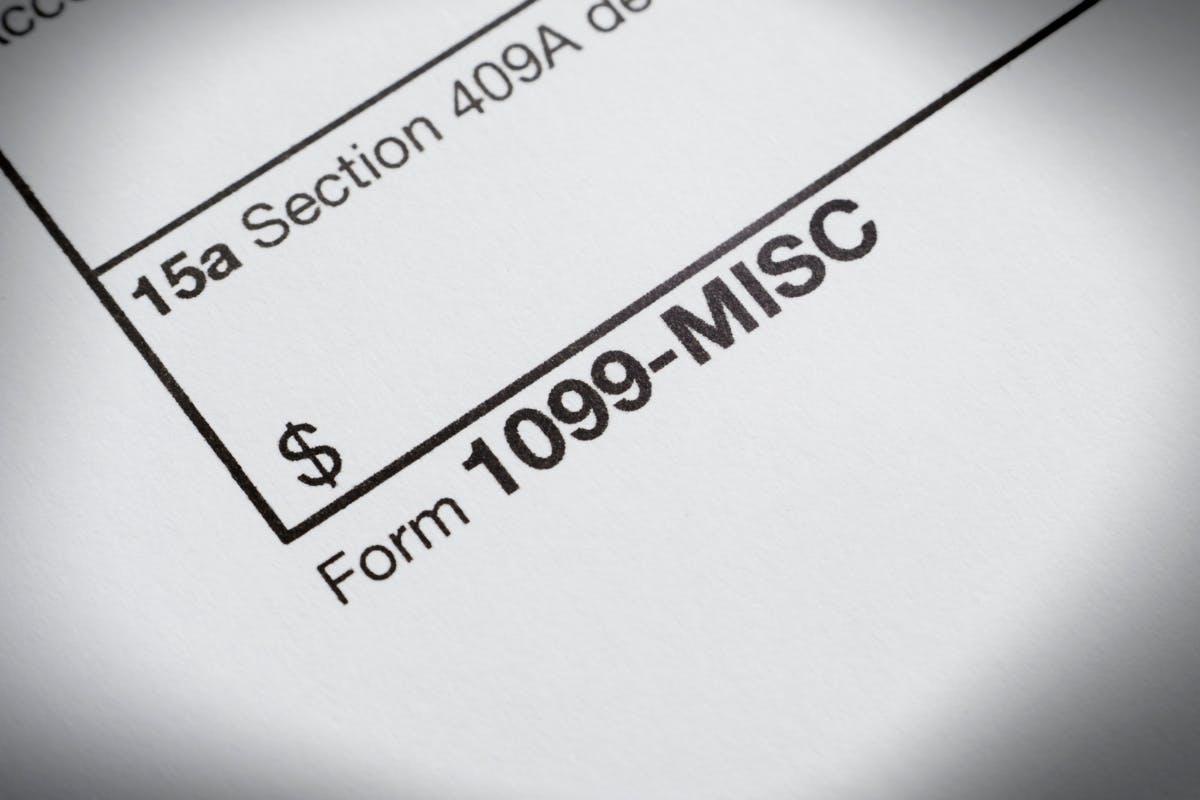
Wondering whether it’s better to form an LLC or be a 1099 contractor for income tax purposes or what their differences are? If so, then you’re in luck.
This guide is for entrepreneurs who want to know the difference between an LLC and an IRS 1099, which they can use for their new business.
Keep reading until the end as we provide you a quick independent contractor vs. LLC comparison to know which is better, when to issue a 1099-NEC, the consequences of not filing a 1099, and more.
Let’s get started.

Courtesy of Canva/GettyImages
What is a Limited Liability Company (LLC)?
A Limited Liability Company (LLC) is a business structure that protects its owners’ personal assets if ever they’re involved in a lawsuit.
With this unique business structure, an LLC can be taxed as a sole proprietorship, a partnership, or an S-corporation.
But unlike an S-corporation restricted only to 100 shareholders, an LLC can have unlimited members. This is why it’s a popular option for startups. It is flexible in such a way that it gives owners convenient taxation options.
With an LLC, your business is completely independent, and your personal finances are not at risk for future business debt.
How to Get an LLC
To create an LLC, follow the basic rules of the state you’re forming it.
Usually, it includes the following:
- naming your LLC,
- appointing a registered agent to receive legal documents and notices on your behalf,
- filing Articles of Organization (AOI) and other formation papers,
- creating an operating agreement to outline how the business will be run, and
- obtaining an Employer Identification Number (EIN) from the IRS.
Related: The Benefits of LLC for Online Business

Courtesy of Canva/ TheCrimsonRibbon
What Is an IRS 1099 Form?
IRS 1099, on the other hand, is a form used to report non-employment income to the Internal Revenue Service. [1]
Businesses use this if they pay $600 or more to a non-employee, usually for independent contract work and freelance service.
Non-employment compensation may cover those made for services during trade or business, payments to someone not your employee, and those made to an estate, partnership, an individual, or sometimes, to a corporation.
It can also include fees, commissions, benefits, and prizes and awards for services made by a non-employee.
There are various types of 1099 forms:
1099-INT is a tax form issued by interest-paying businesses, including investment firms, banks, and financial institutions. It is used to report the interest paid.
1099-S is issued for real estate transactions, such as realizing proceeds or gains from selling commercial and industrial buildings and land.
1099-DIV reports dividends and distributions to taxpayers and the IRS. It is commonly used by banks and financial institutions.
1099-MISC reports payments to individuals providing services to your business. It also reports direct sales of at least $5,000 of consumer products to a buyer for resale. [2]
Does Every LLC Get a 1099?
No, not all LLCs get a 1099. Single-member LLCs or partnership gets a 1099 from firms or individuals paying $600 or more in annual revenue, but not LLCs taxed as an S-corporation.
If you own a single-member LLC, you file taxes using Schedule C, similar to a sole proprietorship.
How Is Money Received From a 1099 Taxed?
Money received from 1099 is taxed as a sole proprietorship.
This means that self-employed people receiving income from 1099 are responsible for paying both the income tax and self-employment tax on their own. The employer will not withhold these taxes.
This is why self-employed individuals must keep accurate records of their income and expenses throughout the year to determine their tax liability and avoid underpayment penalties accurately.
Comparing LLC vs. 1099 - What’s the Difference?
LLC | 1099 |
Flexible; | Taxed as sole-proprietorship |
Limited Liability Protection | No Asset Protection |
Business structure established at the State level | No formal structure is required |
Is It Better To Be a 1099 Independent Contractor or LLC?
Choosing between being a 1099 independent contractor or LLC will ultimately depend on your goals and circumstances.
Independent Contractors Pay Self-Employment Taxes
If you choose to be a 1099 independent contractor, you are treated by the IRS as self-employed and must pay self-employment taxes. This includes both Medicare and Social Security taxes.
And like sole proprietors, you will be liable for any business expenses. Your personal assets may be taken if the business can’t pay its debts.
The advantage of being a 1099 independent contractor is you have the flexibility to control your business operations and work schedule and the opportunity to work for multiple clients.
Conversely, forming an LLC provides liability protection and some tax benefits. The LLC can be taxed as a sole proprietorship, C-corporation, or S-corporation, depending on your business needs.
As a business owner of an LLC, you can potentially reduce the business’ overall tax liability and have greater flexibility in tax planning. In addition, an LLC can be viewed in your industry as more professional. Doing so provides more credibility to existing and potential clients.

Courtesy of Canva/ AndreyPopov
When to Issue 1099-NEC
You must issue form 1099-non employee compensation (NEC) if you have paid an independent contractor $600 or more throughout the fiscal year.
This rule applies to the payment method, whether check, cash, or other forms, such as online payments or money orders.
If you doubt whether the independent contractor should receive a 1099, it’s important to seek professional advice before filing.
Filing a 1099 form for a contractor that doesn’t legally need one may lead to penalties and fines from the IRS.
Moreover, it may potentially cause problems with the contractor, not just with taxes but with other repercussions, as they may be considered to have not been reported accurately.
Sole proprietors also receive a 1099 if they’ve been paid $600 or more by any entity, whether businesses or individuals, over the course of the year.
Consequences of Not Filing 1099
The IRS requires all employers to provide a 1099 Form for freelancers, non-employees, and independent contractors to calculate and assess taxes, interest, and penalties accurately.
Failing to file a 1099 with the IRS has tax consequences. Even late filing may subject you to substantial fines. Sometimes, penalties for not filing may range from $50 to $270 per form. The amount differs depending on how late the filing is and when the form was received.
Then, there are cases when criminal and civil charges may be brought against you when the agency finds that you intentionally filed your tax forms late.
Non-filing of 1099 may likewise cause problems with your workers because they won’t receive their full wages if they have to be liable for unpaid taxes.
This could expose you to legal liability if the employee takes action for not paying proper taxes on their behalf or withholding their proper wages.
Who Is Exempt From a 1099?
Entities exempt from receiving a 1099 include government agencies, nonprofits, and certain corporations. These organizations don't need to receive or file 1099 to the IRS because they are already subject to other forms of taxation.
How to File 1099 for Your LLC in 4 Easy Steps
Filing a 1099 form for your LLC doesn’t have to be overwhelming. Here are the simple steps to file your LLC 1099 form:
Step 1. Find out if your LLC is required to file a 1099 form. All LLCs with one owner are generally not required to file a 1099. However, if your LLC pays non-employees for their services or has more than one member, you must file Form 1099.
Step 2. Gather the following information, which you will need to file in filling out the form:
- The amount being paid
- Contact details of the payee, including their name, Social Security number, tax identification number, and address
- Description of the service provided
- The date of payment
- A copy of the signed independent contractor agreement, if available.
- State-level taxes collected, if any, from the payment.
Step 3. Visit the IRS website and download the 1099-MISC form. Fill in the details completely and accurately and follow the additional instructions in the IRS forms. [3]
Step 4. File the form with the IRS. The filing deadlines beginning in March are for paper forms, while the end of March is for forms filed electronically.
Filing your 1099 form electronically provides several benefits, including the ability to track your tax return status, improved accuracy, increased security, and faster processing times.
Related: Navigating Employment Types: 1099 vs W2 Pros and Cons
What To Do if Your 1099 Form Is Wrong
What if you realized that the Form 1099 you received is in error? Perhaps it overstates your income to a thousand dollars.
One of the best things you can do is reach out to the firm immediately and ask for correction. Sometimes, businesses may be able to correct the error before sending the incorrect form to the IRS.
Meanwhile, if you’re an employer who submitted the incorrect 1099, your solution is to file a corrected form using the same method when you filed the original 1099 form. Then, send a copy to your independent contractor so they can use the same when filing their taxes.
We Can Help
As the tax code becomes more complex, our accounting company provides custom accounting solutions to companies and individuals to lessen their tax liability and simplify taxation as much as possible.
We aim to help you focus more on what you do best while we take care of the numbers.
For instance, we can help file your 1099 forms and ensure all other required forms are sent to the IRS and the relevant parties. We can also advise you on how your LLC will be taxed.
Related: How Much Does an Accountant Cost in Dallas?
The Bottom Line
An LLC is a business entity that shields its owners’ personal assets if they face a lawsuit and offers management flexibility.
Being a 1099 contractor, on the other hand, gives you the flexibility to work for multiple clients, and you have control over your business operations. In addition, you pay taxes only on your business income.
Ultimately, whether you choose to be a 1099 contractor or form an LLC will depend on your goals and risk.
References:
[1] https://www.irs.gov/pub/irs-pdf/f1099nec.pdf